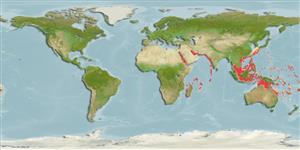Echinoidea |
Clypeasteroida |
Clypeasteridae
Environment: milieu / climate zone / ระดับความลึก / distribution range
นิเวศวิทยา
; ระดับความลึก 0 - 216 m (อ้างอิง 81020). Tropical
Indo-West Pacific.
Length at first maturity / ขนาด / Weight / Age
วัยเจริญพันธุ์: Lm ? range ? - ? cm
Found on fine sand that is superficially muddy, on sand between coarse and fine grade, and on plain coarse sand (Refs. 103193, 129602). Genus Clypeaster feeds by crushing sand-sized particles and producing finer sediments (Refs. 108727, 129602). Burrows in coarse or fine sediment (Ref. 129602).
Life cycle and mating behavior
วัยเจริญพันธุ์ | การสืบพันธุ์ | การวางไข่ | Eggs | ความดกของไข่ | Larvae
Members of the class Echinoidea are gonochoric. Fertilization is external. Brooding is common, eggs are held either on the peristome, around the periproct or deep into the concavities on the petaloids. Life cycle: Embryos develop into planktotrophic larvae (echinoplateus) and live for several months before they sink to the bottom using their tube feet to adhere on the ground where they metamorphose into young urchins.
Lane, D.J.W., L.M. Marsh, VandenSpiegel and F.W.E. Rowe 2000 Echinoderm fauna of the South China Sea: an inventory and analysis of distribution patterns. The Raffles Bulletin of Zoology (Suppl. 8):459-493. (อ้างอิง 81020)
IUCN Red List Status
(อ้างอิง 130435: Version 2025-1)
CITES status (อ้างอิง 108899)
Not Evaluated
CMS (อ้างอิง 116361)
Not Evaluated
Threat to humans
Human uses
| FishSource |
เครื่องมือ
ข้อมูลเพิ่มเติม
Population dynamicsการเจริญเติบโต
Max. ages / sizes
Length-weight rel.
Length-length rel.
Length-frequencies
Mass conversion
อุดมสมบรูณ์
Life cycleการสืบพันธุ์วัยเจริญพันธุ์ความดกของไข่การวางไข่EggsEgg developmentLarvae Human RelatedStamps, coins, misc.
แหล่งที่มาจากอินเตอร์เน็ต
Estimates based on models
Preferred temperature
(Ref.
115969): 21.2 - 28.2, mean 26.3 (based on 278 cells).
